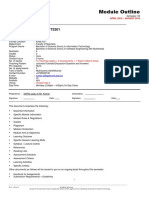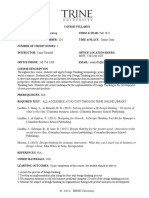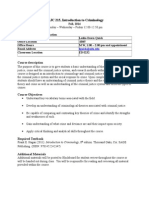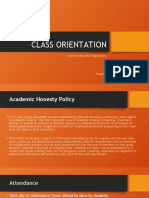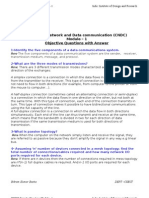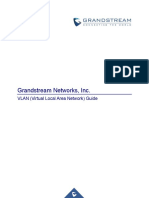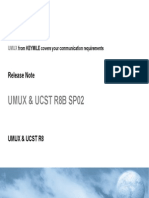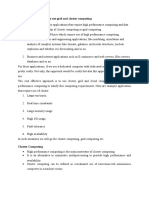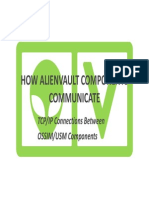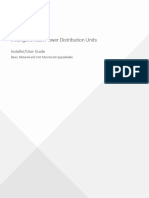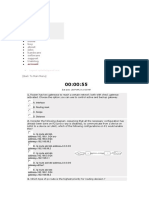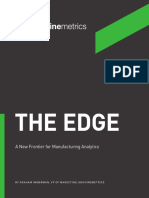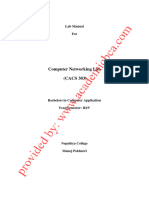ICT Module Outline Nov 2023
Uploaded by
banguraabubakarr006ICT Module Outline Nov 2023
Uploaded by
banguraabubakarr006Module Outline
Faculty of Information Communications & Technology
Semester: 01
November 2023 to February 2024
ICT101
INFORMATION COMMUNICATION TECHNOLOGY 1
MODULE DETAILS
Course Location : Sierra Leone Campus
Examiner : Oluwatosin Babarinde Ayorinde
Contact details (email) : ayorinde.oluwatosin@limkokwing.edu.sl
Co-Examiner : Santigie Foday Kamara
Pre-requisite : ICT
Credits Amount : 3 credits
Contact hours per week : 3 hours (2 hours lecture & 1 hour tutorial)
No. of weeks : 7 weeks contact + 1 week midterm break + 1-week final examination
No. of assignments : Lab exercise & Final Project
No. of written exam : 2 (Mid-term & Final Examination)
Portfolio : https://eledalab.com
Venue : Lecture Room 1
Day :
Time : 8.30 am to 11:30 am
Prepared by: Oluwatosin B. Ayorinde Approved by AQA:
Signature: Stamp, Date &
Signature:
Date: 4/11/2023
Checked by: Santigie F. Kamara
Signature:
Date: 4/11/2023
This document comprises the following sections:
1. Essential Information
2. Specific Module Information
3. Module Rules & Regulations
4. Grading System
5. Academic Dishonesty /Plagiarism
6. Copyright, Patents and Ownership of Work
7. Module Introduction
8. Module Aims & Objectives
9. Learning Outcomes
10. Specific Generic Learning Skills
11. Unit Syllabus + Learning Outline
12. Recommended Texts & References
13. Assignment Schedule
14. Assessment Criteria
15. Specific Criteria
The following additional documents will be issued to you during the course of the semester:
Lecture Notes
Assignment and Project Briefs (including submission requirements & guidelines)
Updated by: Academic Management Unit 2023 Page 1 of 8
All Rights Reserved
No part of this document may be reproduced without written approval from Limkokwing University of Creative Technology
Module Outline
Faculty of Information Communications & Technology
Semester: 01
November 2023 to February 2024
1. ESSENTIAL INFORMATION
All modules other than electives are 'significant modules'.
As an indicator of workload, one credit carries and additional 2 hours of self-study per week. For example, a
module worth 3 credits require that the student spends an additional 6 hours per week, either reading,
completing the assignment or doing self-directed research for that module.
Submission of ALL assignments is compulsory in this module. A student cannot pass this module without
having to submit ALL assignments by the due date or an approved extension of that date.
All assignments are to be handed on time on the due date. Students will be penalised 10 percent (of the
total marks for each assignment) for the first day and 5 percent per day thereafter for late submission (a
weekend or a public holiday count as one day). Any late submission without legitimate validated reason
after the Board of Studies will not be accepted.
Extensions of deadline for submission of assignments may be granted if a medical certificate accompanies
the application for extension. However, for students who fail to submit their assignment (s) on the
stipulated date due to any emergency or unforeseen circumstances (accident, health issues etc.), evidence
must be presented to the Year Leader for verification. In situations where a valid medical certificate/doctor’s
note could not be provided or verified, the students would be cross-examined by the Year Leader and the
Students’ Counsellor to probe the validity of the incident, before an extension could be granted. Only the
Head of Faculty can grant approval for extension of submission beyond the assignment deadline.
Overseas travel is not an acceptable reason for seeking a change in the examination schedule.
Re-submission of work can only receive a 50% maximum pass rate.
Supplementary/Deferred exams can only be granted if the level of performance is satisfactory and the
students’ assessments have been completed.
Students must pay up to 50% of the semester fees to be eligible for registration, and pay up to 100% of
the semester fees to be eligible for final examinations.
Students are expected to print their Exams-dockets from their student portal and present it at the entrance
of the exam venue.
Harvard referencing and plagiarism policy will apply on all written assignments.
2. SPECIFIC MODULE INFORMATION
Attendance rate of 80% is mandatory for passing module at the end of the semester.
All grades are subject to attendance and participation.
Absenteeism at any scheduled presentations will result in zero mark for that presentation.
Visual presentation work in drawn and model form must be the original work of the student.
3. MODULE RULES AND REGULATIONS
Assessment procedure:
These rules and regulations are to be read in conjunction with section 7 (Unit Aims and Objectives)
All assignments/projects must be completed and presented for marking by the due date.
Marks will be deducted for late submission without justifiable reasons.
Student must deliver all assignments in person to the lecturer concerned. No other lecturer is allowed to
accept students’ assignments.
All tests/examinations are compulsory.
Students must take the test/exam on the specified date.
Students are expected to be familiar with the test/examination schedule.
Students who miss Tests or Assignments or Exams without a genuine reason will not be allowed to sit for
the examination, resulting in them repeating the module.
Any scheduling of tutorials/consultations, both during and after lecture hours, is the responsibility of each
student. Appointments are to be proposed, arranged, confirmed, and kept, by each student.
Tutorial sessions/consultations without appointments will also not be entertained.
Note that every assignment is given an ample time frame for completion. This, together with advanced
information pertaining deadlines gives you NO EXCUSE not to submit assignments on time.
Updated by: Academic Management Unit 2023 Page 2 of 8
All Rights Reserved
No part of this document may be reproduced without written approval from Limkokwing University of Creative Technology
Module Outline
Faculty of Information Communications & Technology
Semester: 01
November 2023 to February 2024
4. GRADING SYSTEM
In the assessment of all student works, the grading system is standardized for all subjects in all
programmes, as tabulated below:
Marks Grade GPA & CGPA Description
90-100 A+ 4.00
Pass with Distinction
85-89 A 4.00
80-84 A- 4.00
75-79 B+ 3.67
Pass with Merit
70-74 B 3.33
65-69 B- 3.00
60-64 C+ 2.67
Pass
55-59 C 2.33
50-54 C- 2.00
0-49 F 0.00 Fail
PC 1.00 Pass Conceded
Conditional Grades
X 0.00 Outstanding Supplementary Assessment
PX 1.00 Pass (supplementary work submitted)
DNA 0.00 Did not Attend
DNC 0.00 Did Not Complete
DNS 0.00 Did Not Submit
EXP - Exempted
DEF - Deferred
5. ACADEMIC DISHONESTY/PLAGIARISM
Academic Dishonesty or academic misconduct is any type of cheating that occurs in relation to a formal
academic exercise. It can include:
Plagiarism: Plagiarism is a form of cheating. Plagiarism may occur in oral, written or visual presentations. It
is the presentation of the work, and idea or creation of another person, without attribution as though it’s your
own. Plagiarism is not accepted in any form. The use of another person’s work or ideas must be
acknowledged. The advancement of information technology has enabled students to copy images and text
from all over the world (via internet). If a student’s work is found to have cop- ied elements without
acknowledgement, the penalty will be a failed grade for the piece of work in question. The Limkokwing
University Sierra Leone Campus recognises the Harvard Referencing style as the official referencing style for all
submitted work.
Fabrication: The falsification of data, information, or citations in any formal academic exercise.
Deception: Providing false information to an instructor concerning a formal academic exercise-e.g., giving a
false excuse for missing a deadline or falsely claiming to have submitted work.
Cheating: Any attempt to give or obtain assistance in a formal academic exercise (like an examination)
without due acknowledgement.
Bribery: or paid services. Giving certain test-answers for money.
Sabotage: Acting to prevent others from completing their work. This includes cutting pages out of library
books or wilfully disrupting the experiments of others.
Students found to have been involved in academic dishonesty will be treated as follows:
1. Plagiarism and fabrication in Assignments, Projects or Presentations: A zero (0) mark will be awarded
to the work.
Updated by: Academic Management Unit 2023 Page 3 of 8
All Rights Reserved
No part of this document may be reproduced without written approval from Limkokwing University of Creative Technology
Module Outline
Faculty of Information Communications & Technology
Semester: 01
November 2023 to February 2024
2. Deception: 10% (of the total marks for each assignment) will be deducted on the first day of late
submission and 5% a day thereafter. Late submission on or after BOS will not be accepted.
3.Cheating: Any form of assistance in a test will be rewarded a zero (0) mark. While in an examination the
student automatically repeats the module.
4. Bribery, Sabotage or professorial misconduct: Committing any of these offenses will lead to dis-
continuance from the university for a certain period depending on the seriousness of the offence.
Using Internet Sources: The World Wide Web has become a popular source of information for students’ papers,
and many questions have arisen about how to avoid plagiarizing these sources. In most cases, the same rules apply
as for a printed source: when you refer to ideas or quote from a WWW site, you must cite that source. If you want to
use visual information from a WWW site, many of the same rules apply. Copying visual information or graphics from
a WWW site (or from a printed source) into a paper is very similar to quoting information, and the source of the
visual information or graphic must be cited. These rules also apply to other uses of textual or visual information from
WWW sites.
6. COPYRIGHT, PATENTS AND OWNERSHIP OF WORK
All use of borrowed work, whether text or images must be referenced and acknowledged. Limkokwing is not liable
for any infringement of copyright within students’ work. Students are to abide by International Copyright laws.
Students engaged in project activities will be required, as a Condition of acceptance as a student, to agree to assign
to Limkokwing their right, title and interest in any invention or visual work arising from their studies with the
university. Limkokwing has the right to keep students work for use in archives, exhibitions and events. Where
students wish to keep original work, they must apply in writing and gain permis- sion from the Academic
Management.
7. MODULE INTRODUCTION
The Information Communication Technology 1 (ICT1) module serves as an essential foundation for understanding
the world of Information and Communication Technology (ICT). In this module, students will explore the key
components, concepts, and applications that form the backbone of ICT. The module aims to equip students with
practical skills, theoretical knowledge, and a comprehensive understanding of the dynamic ICT landscape.
8. MODULE AIMS AND OBJECTIVES
Module Aims:
The primary aims of the ICT1 module are:
1. To introduce students to the fundamental concepts and terminology in Information Communication
Technology.
2. To develop practical skills in using ICT tools and applications.
3. To foster critical thinking and problem-solving abilities in the context of ICT.
4. To create awareness of the ethical and societal aspects of ICT.
Module Objectives:
By the end of this module, students should be able to:
1. Gain a clear understanding of the core components and functions of ICT systems.
2. Develop proficiency in using various software applications and tools.
3. Analyze and solve real-world problems through the application of ICT.
4. Evaluate the impact of ICT on society, including ethical considerations.
9. LEARNING OUTCOMES
Upon completion of this module, students should be able to:
At the end of the module, students would have:
1. Define and explain fundamental ICT concepts and terminologies.
2. Effectively utilize common ICT tools and applications.
3. Demonstrate problem-solving skills in ICT-related scenarios.
Updated by: Academic Management Unit 2023 Page 4 of 8
All Rights Reserved
No part of this document may be reproduced without written approval from Limkokwing University of Creative Technology
Module Outline
Faculty of Information Communications & Technology
Semester: 01
November 2023 to February 2024
4. Assess and discuss the ethical and societal implications of ICT.
10. SPECIFIC GENERIC LEARNING SKILLS
At the end of the module, students are expected to acquire the following skills:
1. Problem Solving: Students should develop the ability to analyze complex problems and break them down
into manageable components. Problem-solving skills are essential in troubleshooting issues with hardware,
software, and networks.
2. Critical Thinking: Encouraging students to think critically helps them evaluate different ICT solutions and
make informed decisions. Critical thinking is particularly important when choosing between various software
applications or technology solutions.
3. Attention to Detail: In ICT, precision is crucial. Encourage students to pay close attention to details,
whether it's in coding, configuring a network, or maintaining data accuracy.
11. UNIT SYLLABUS + LEARNING OUTLINE
Week: 1
LECTURE: 1 INTRODUCTION TO ICT
Lecture Synopsis: - Understanding ICT
Introduction to ICT, its scope, and importance
Discussion: Historical evolution of ICT
Basics of Computer Systems, Components of a computer system
Operating Systems, Introduction to Operating Systems
Activity: Installing and configuring an operating system
Handout: - Course Outline/ Note
Week: 2
LECTURE: 2 NETWORKING AND INTERNET TECHNOLOGIES
Lecture Synopsis: - Networking Fundamentals
Basics of computer networks, Setting up a simple LAN
Internet and World Wide Web, How the internet works, Web technologies and protocols
Cloud Computing, Introduction to Cloud Computing
Activity: Setting up a cloud-based account
Handout: - Tutorial / Assignment 1
Week: 3
LECTURE: 3 SOFTWARE AND PROGRAMMING
Lecture Synopsis: - Types of Software
Different types of software and their uses
Activity: Installing and using software applications
Introduction to Programming
Basics of programming languages
Lab: Writing simple programs
Handout: - Note
Issuing of Final Project
Week: 4
LECTURE 4: SOFTWARE DEVELOPMENT LIFE CYCLE
Lecture Synopsis: - Overview of software development processes
Real-world software development examples
Lab exercise -
Updated by: Academic Management Unit 2023 Page 5 of 8
All Rights Reserved
No part of this document may be reproduced without written approval from Limkokwing University of Creative Technology
Module Outline
Faculty of Information Communications & Technology
Semester: 01
November 2023 to February 2024
Assignment - Submission of Assignment 1 and Consultation of Final Project
Week: 5
LECTURE: 5 EMERGING TECHNOLOGIES
Lecture Synopsis: Artificial Intelligence and Machine Learning;
Internet of Things (IoT), Understanding IoT and its impact;
Blockchain Technology;
Instructor guidance: One-on-one sessions with students
Week: 6 MID-TERM EXAM
__________________________________________________________________________________________
Week: 7
LECTURE 7 FINAL PROJECTS AND PRESENTATIONS
Lecture Synopsis: - Presentation: Students present their final projects
Assessment: Evaluation of the final projects
Week: 8 and 9
Final Examination (dates will be announced)
12. RECOMMEND TEXTS & REFERENCES
1. "Introduction to Information Systems" by R. Kelly Rainer and Brad Prince
This book provides an excellent introduction to the fundamental concepts of information systems,
making it suitable for students new to the field of ICT.
2. "Computer Networks: Principles, Technologies, and Protocols for Network Design" by Natalia
Olifer and Victor Olifer
A comprehensive guide to computer networks, covering principles, technologies, and network
design. It's a valuable resource for students looking to understand network fundamentals.
3. "Computer Science: An Overview" by J. Glenn Brookshear and Dennis Brylow
This book offers a broad overview of computer science, including topics like hardware, software,
algorithms, and data structures, making it a valuable resource for ICT students.
4. "Database Systems: Design, Implementation, and Management" by Carlos Coronel and Steven
Morris
For students interested in database management, this text covers the design and implementation
of databases and is suitable for beginners.
13. ASSIGNMENT SCHEDULE
ASSIGNMENT DESCRIPTION ISSUE DATE DUE DATE %
Assignment 1 Week 2 Week 4 15%
Mid-Term Exam Week 6 Week 6 20%
Final Project Week 7 Week 7 35%
Final Exam Week 8 Week 9 30%
TOTAL 100%
Updated by: Academic Management Unit 2023 Page 6 of 8
All Rights Reserved
No part of this document may be reproduced without written approval from Limkokwing University of Creative Technology
Module Outline
Faculty of Information Communications & Technology
Semester: 01
November 2023 to February 2024
14. ASSESSMENT CRITERIA
Marks Grade Description
90-100 A+ Publishable, Outstanding Work: Assignment is of sufficient substance and style to be
submitted to a referred journal for publication or public presentation. Superior
understanding of the subject matter. Evidence of original thinking and an extensive
knowledge base. Careful, concise, critical analysis with a clear and well-argued hypothesis
based on the material. Shows a capacity to analyse, synthesize, and evaluate material.
Shows a grasp of all the scholarly issues involved. Shows evidence of learning being
extended beyond the initial learning situation. Clear thesis and conclusion. Well-
researched and documented. Stylistically flawless.
85-89 A Excellent: Solid understanding of the subject matter. Good analysis and some critical
reasoning. Reasonable understanding of relevant issues and familiarity with the material.
Demonstrates a solid understanding of the relationship or connections among the basic
concepts. Needs to be more concise or precise in details and more careful in forming
arguments. Stylistically sound.
80-84 A- Very-Good: typically represents a high level of achievement, but not quite as high as an
A. An A- grade is often considered a very good grade, and it is typically given to students
who have demonstrated a strong understanding of the course material and have
performed well on exams, assignments, and other assessments.
75-79 B+ Good: Generally accurate account of the subject matter with acceptable analysis and
some critical reasoning. Some interaction with relevant material. Demonstrates some
understanding of the relationship or connection among the basic concepts. Needs more
precision and attention to details and greater precision in the use of arguments. Some
careless stylistic errors.
70-74 B Fine: Generally accurate description of the subject matter and an adequate grasp of the
critical issues and ideas involved. Demonstrates rudimentary understanding of the
relationship or connection among the basic concepts. Needs more attention to detail and
better use of arguments. Some careless stylistic errors.
65-69 B- Average: Acceptable treatment of the subject matter. Demonstrates an understanding of
the basic facts, vocabulary, details, and elemental concepts. Shows an ability to deal with
simple issues arising out of the material. Needs to explore the subject matter more fully
and formulate ideas more clearly. Closer attention should be given to stylistic elements
including sentence structure and paragraph organization.
60-64 C+ Adequate: Generally acceptable treatment of the subject matter and issues.
Demonstrates an awareness of the basic facts, vocabulary, details, and elemental
concepts. Impressionistic or vague at points. Shows that the learning experience was
profitable. Lacks clarity in formulating the issues and shows little or no evidence of critical
reflection on the issues or data. Closer attention should be given to grammar, spelling,
and punctuation.
55-59 C Minimally Acceptable. Adequate understanding and treatment of the data and issues,
but imprecise, impressionistic or vague. Lacks clarity in expressing the issues and shows
no evidence of critical reflection on the issues or data. Major problems related to issues of
style.
50-54 C- Low: Lack in understanding and treatment of the data and issues, failed to show ability to
analyse or in expressing the issues.
0-49 F Inadequate. Sloppy, imprecise or careless discussion of the material with little or no
Updated by: Academic Management Unit 2023 Page 7 of 8
All Rights Reserved
No part of this document may be reproduced without written approval from Limkokwing University of Creative Technology
Module Outline
Faculty of Information Communications & Technology
Semester: 01
November 2023 to February 2024
evidence of critical reflection. Stylistically flawed.
Conditional Grades:
A conditional grade is a grade assigned to a student based on certain conditions that need to be met
in order to receive a final grade.
1.00 PC Pass Conceded: This is a grade awarded to a student who has not quite met the
requirements for a passing grade, but who is being given a pass nonetheless due to
special circumstances. This grade is typically higher than a failing grade but lower than
the lowest passing grade.
1.00 PX Pass (Supplementary work submitted): This is a grade used to indicate that a
student has passed a module after submitting supplementary work or completing
additional requirements.
0.00 X Outstanding Supplementary Assessment: In the case of a student who is granted
supplementary work/s submission by the faculty, a grade X should be entered. An X grade
is an interim grade until the supplementary work/s is/are submitted and assessed at the
earliest possible timeframe. After a student has passed the supplementary work/s, the
student shall be awarded with a normal grade. This is limited to ‘C’ band.
0.00 DNC Did Not Complete: In the case of a student who has registered, is on a class list, has
attended some classes, but has not submitted any work, a grade of DNC should be
entered. A 0.00 grade point is attached to this grade.
0.00 GNS Grade Not Submitted: In the case of an emergency or unforeseen circumstances and
grade/s is/are yet to be submitted at time of Senate e.g., waiting for Internship to be
completed, a GNS should be entered.
0.00 DNA Did not Attend: This is a grade used to indicate that a student did not attend a
particular module.
0.00 DNS Did Not Submit: This is a grade used to indicate that a student did not submit a
particular required assessment for a module. It implies that the student did not turn in the
work by the due date or did not turn it in at all.
- DEF Deferred: In the case of a student who has registered, is on a class list, but has decided
to drop the module after the approved dropped date i.e., Week 4, a grade of DEF should
be entered. There is no grade point attached to this grade.
- EXP Exempted: This implies that a student has been granted exemption from taking certain
modules in a program of study. Exemption may also be granted for "advance standing" or
"credit transfer", which means that a student is allowed to skip certain courses or modules
and receive credit towards their degree for equivalent coursework completed at another
institution.
15. SPECIFIC CRITERIA
Each assignment will be handed out with the project brief and will vary, depending on the teaching and
learning objectives of the specific assignment.
Each student will receive a completed assessment sheet back with their marks, thereby giving student
feedback on each set criterion and the project as a whole.
All submission must be made directly to the lecturer-in-charge.
Updated by: Academic Management Unit 2023 Page 8 of 8
All Rights Reserved
No part of this document may be reproduced without written approval from Limkokwing University of Creative Technology
You might also like
- CRT3201 Critical Thinking (APR 2019 - AUG 2019) - Module OutlineNo ratings yetCRT3201 Critical Thinking (APR 2019 - AUG 2019) - Module Outline8 pages
- Student Copy - Advanced Social Psychology - MPS 333 - Final Courseplan 2025-26No ratings yetStudent Copy - Advanced Social Psychology - MPS 333 - Final Courseplan 2025-2629 pages
- Advanced Social Psychology - MPS 333 - Final Courseplan 2025-26 StudentsNo ratings yetAdvanced Social Psychology - MPS 333 - Final Courseplan 2025-26 Students29 pages
- Advanced Social Psychology - MPS 333 - Final Courseplan 2025-26No ratings yetAdvanced Social Psychology - MPS 333 - Final Courseplan 2025-2628 pages
- EDUC1260 ICT Literacy 2025 Course OutlineNo ratings yetEDUC1260 ICT Literacy 2025 Course Outline6 pages
- COMP108-Computer Architecture - Module OutlineNo ratings yetCOMP108-Computer Architecture - Module Outline10 pages
- PSYC 220 - 001 Syllabus Winter 2025 OnlineNo ratings yetPSYC 220 - 001 Syllabus Winter 2025 Online6 pages
- Translation One Midterm Exam ConstituentsNo ratings yetTranslation One Midterm Exam Constituents4 pages
- Faculty of Computing, Engineering and Technology: Module Title: Module Code: CT104-3-2 Level: Credits: School: SemesterNo ratings yetFaculty of Computing, Engineering and Technology: Module Title: Module Code: CT104-3-2 Level: Credits: School: Semester6 pages
- Introduction Phil - Indigenous CommunitiesNo ratings yetIntroduction Phil - Indigenous Communities14 pages
- Course Plan Template - Lca Basic Research MethodNo ratings yetCourse Plan Template - Lca Basic Research Method17 pages
- Systems Security-BIC3263 - Course OutlineNo ratings yetSystems Security-BIC3263 - Course Outline9 pages
- Essential Skills ISYS10301 Academic Development CourseworkNo ratings yetEssential Skills ISYS10301 Academic Development Coursework9 pages
- Introduction To Humanities: Text and MaterialsNo ratings yetIntroduction To Humanities: Text and Materials5 pages
- Course Syllabus FA24 Financial Accounting BUS 210 02: Instructor Contact InformationNo ratings yetCourse Syllabus FA24 Financial Accounting BUS 210 02: Instructor Contact Information11 pages
- Section B of Course Reader Academic ProgrammeNo ratings yetSection B of Course Reader Academic Programme6 pages
- Business English Eng102: M Arket L Eader - Business LifeNo ratings yetBusiness English Eng102: M Arket L Eader - Business Life4 pages
- 23-24 Skills Portfolio Coursework SpecificationNo ratings yet23-24 Skills Portfolio Coursework Specification13 pages
- BPR 130 0002 Tuesday and Thursday Syllabus Fall 2022No ratings yetBPR 130 0002 Tuesday and Thursday Syllabus Fall 20227 pages
- Bk.2 MasterSiteSoftwareInstallationAndConfiguration D60RevDNo ratings yetBk.2 MasterSiteSoftwareInstallationAndConfiguration D60RevD203 pages
- Grandstream Networks, Inc.: VLAN (Virtual Local Area Network) GuideNo ratings yetGrandstream Networks, Inc.: VLAN (Virtual Local Area Network) Guide16 pages
- HP 3PAR StoreServ 7000 Storage Site Planning ManualNo ratings yetHP 3PAR StoreServ 7000 Storage Site Planning Manual55 pages
- Motivation Behind Why To Use Grid and Cluster ComputingNo ratings yetMotivation Behind Why To Use Grid and Cluster Computing7 pages
- Agricultural Extension and Communication Exam100% (10)Agricultural Extension and Communication Exam26 pages
- CISA - Domain 5 - Protection of Information Assets100% (3)CISA - Domain 5 - Protection of Information Assets202 pages
